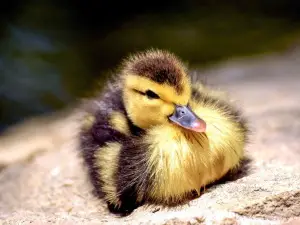
Ducks are loud, anyone who has ever owned ducks knows that these animals are very loud, this may not be an issue for you but it can be an issue for your neighbors
What you may not know is that baby ducklings are loud too and they will chirp a whole lot. This article explores why ducklings chirp so much
Table of Contents
Why are my ducklings chirping so much?
These birds like to communicate with each other and one of the ways that these birds communicate with each other is by making loud chirping noises. But if your birds seem to be chirping too much then reasons why include:
Being scared:
Ducks can become scared quite easily, these birds know that they are low on the food chain and even the younger ducklings know what a threat is
If your birds suddenly start chirping then the birds were likely threatened by something and are making a noise
What to do:
Whatever the birds feel threatened by needs to be removed from the scene.
The threat may not only be regular duck predators like coyotes, foxes, and raccoons, your everyday domestic animals like your cat and dog may be the reason why your bird is chirping so much
Take note of when the birds start making all this noise and get the predator animal away from the ducklings.
The birds are hungry:
Hungry ducklings will definitely vocalize that they are hungry, this looks like the birds chirping very loudly.
Birds that don’t like the feed that they are given will also chirp loudly because they are hungry but don’t like the food offered.
What to do:
Make sure that you serve the birds enough food for all of them but also make sure that the bird is fed food that they enjoy and can eat.
If the birds don’t like or can’t eat certain foods you may need to soak their feed to make it easier to eat or give the birds more of a variety of foods.
It’s too cold:
Ducklings have very thin and light feathers, their heavier feathers only start to grow when the birds lose their light and airy yellow feathers and start to develop their adult feathers
Their mothers usually keep the birds warm but if they have no mother and no other heat source then they can start to chirp a lot.
If you’re not sure if the birds are too cold you can check for the other signs of a duckling being too cold, these include the birds huddling together and trying to huddle up at any heat source that they can, that being a light bulb
What to do:
Ducklings do best when they are in a warm temperature, you can increase the temperature that your ducks are in by adding a heat lamp to the brooder.
The heat source of the brooder should create an environment that is at around 90-95 degrees Fahrenheit.
Being excited:
If your ducklings are excited about something then the birds will get very chirpy, this can happen when you give the birds food or when they are allowed to swim in water.
You can tell that the ducks are excited if they run to get the food you’ve just served or run towards the water to experience water for the first time doing both with great enthusiasm.
What to do:
If the birds are excited about eating and swimming there isn’t anything that you need to do, just enjoy that your little birds are happy and let them bask in their excitement.
Make sure that the birds have enough food to keep pushing from happening and if a traffic jam happens when the birds are released when swimming make sure that the birds have access to the water on all sides.
Mimicking each other:
If your ducklings have a variety of birds around them or even older birds around them then the birds will mimic each other chattering happily amongst each other and socializing.
This will likely be a constant thing and the birds will only stop chattering when they are tired.
The birds may also mimic each other or communicate with each other non verbally and you’ll be able to see this too
What to do:
There isn’t anything you can do in this case, as long as the birds are around each other they will chirp.
If you want them to make less of a noise while interacting with each other then you may want to separate the birds. However, these birds are social animals and need each other around to keep from feeling lonely
Ducks don’t like being alone and they definitely don’t like to live alone so you may simply have to live with the birds chirping.
FAQ:
How can you tell if a baby duck is stressed:
While your baby duck won’t tell you it’s stressed, there are a variety of signs that indicate that the animal is stressed.
Signs that your baby duck is stressed include lethargy, depression, listlessness, a loss of appetite, weight loss, diarrhea, vomiting, ruffled feathers, disinterest in normal routines, and sudden lameness.
What sounds do ducks make when happy?
A happy duck will not only chirp but it will also wag its tail when it feels happy and excited.
The wagging can be excitement or happiness because it is enjoying what it’s eating, having a nice swim, or being happy to see you.
If you enjoyed this article then you may also be interested in other duck related articles. Here are some articles that you may be interested in: Do Ducks Protect Chickens?, Why Is My Duck Acting Drunk?, Why Do Ducks Waddle?, Duckling Swollen Chest, Why Are My Ducklings Chirping So Much?

